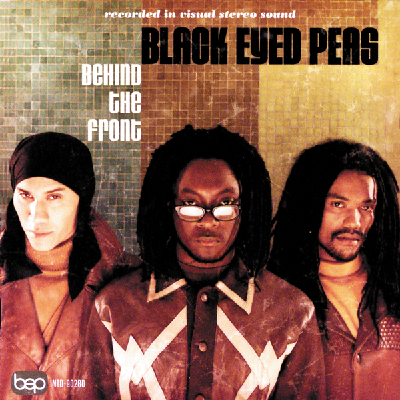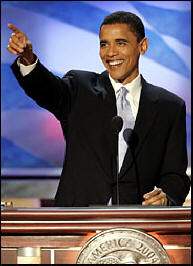“Yes We Can” is the Barack Obama-affirming musical short by Black Eyed Peas front man and producer “Will.i.am” Adams Jr. It’s peopled by minor celebrities, and Scarlett Johansson, sing-songing an insignificant melody to text and footage from Obama’s January 8, 2008 New Hampshire primary victory speech. As I post this, it’s been viewed 5,460,140 times at its main YouTube location.
Make that 5,460,140.5 times: I only got halfway through it before I just couldn’t take any more.
Pourquoi? I think it’s more than the film’s bloated, black & white solemnity and manufactured earnestness, both, perhaps, best signified by an otherwise throwaway gesture at the 0:06 mark: Will.I.Am “offhandedly” “fixing” a lapel pin that appears to be just fine. (These despicable qualities are also on display in the newer, “We Are The Ones” video, as is another starlet, Jessica Alba.) Indeed, to really put one’s hand on what the problem is, one has to briefly go back to the recorded origins of the Black Eyed Peas in the 1990s.
Back then, the scrappy, jazz-inflected “Native Tongues sound”—led by crews like A Tribe Called Quest and De La Soul, and brought up in the rear by acts like Black Sheep—was enjoying significant commercial and, even more, artistic success.
In their wake, a host of other artists—some innovators, some imitators—sporting dreadlocks, bohemian wears, and an overturned Scrabble board’s worth of cunningly-spelled monikers sprung up across the country and musical landscape.
As is typical in any musical bloom, most of these acts did not survive, especially with the ascent, in the early ’90s, of the more aggressive, less metaphysical form of hip-hop driven by West Coast rappers (and mislabeled “gangster rap” by an L.A. Times journalist, a term artists originally resisted). This sound would also influence the Southwest hip-hop scene, naturally, as most Black people from California and the surrounding area have roots there, then the South.
Not all West Coast acts sounded like N.W.A and their ilk. At the very same time Dre ‘n ’em were claiming turf, West Coast acts like Del the Funky HomoSapien, Hieroglyphics, and The Pharcyde were still keeping the Native Tongues style alive, and reworking it, doing so into the end of the ’90s, and afterward, most ultimately independent of major label support.
Black Eyed Peas was not one of those groups. When the Native Tongues fire sale took place at the turn of the century, and Houston and ATL became new centers for hip-hop culture, the Peas were one of the West Coast acts that had to come up something new, and they couldn’t go hard. Nobody would have believed Will.I.Am with a gat. Plus, unlike Del, Hiero, etc., they’d earned little success or credibility as hip-hop artists.
But there was an even bigger problem: Their music. I can distinctly remember, ten years ago, listening to their 1998 debut—ironically-titled, as it subsequently struck me—Behind the Front.
 What most stood out was the album’s absolutely striking absence of soul. It was a mess. That is, when you looked at the Peas—considering visual style, samples, production, lyrics—it seemed like, on the face of it, all the parts were there. But then they put it together, it was empty. It felt sort of like a Cool Jazz version of the BeBop that the Native Tongues were doing.
What most stood out was the album’s absolutely striking absence of soul. It was a mess. That is, when you looked at the Peas—considering visual style, samples, production, lyrics—it seemed like, on the face of it, all the parts were there. But then they put it together, it was empty. It felt sort of like a Cool Jazz version of the BeBop that the Native Tongues were doing.
It was groovy enough for certain white people, though, and with a little retooling, particularly the inclusion of a “soulful” blue-eyed female vocalist, Fergie, and a poppier sound, the Peas were on their way.
Of course, it was more complicated than that, but not essentially. In short, I think that what the Black Eyed Peas found is that, over to the right of Black people, there is a place where certain Black artists can go when Black people have no real use for them, but where white people will eye them with a certain warm fascination.
Staying there requires that you be extremely nice to those white people, that you make no sudden moves or large sweeping gestures. If you do this, however, and especially if you’re nice, you can stay there for a very long time.
Those paying attention will have already observed something that is not my main point: That in line with meeting over “Yes We Can,” what the Black Eyed Peas’ have done musically is what Barack Obama has, amazingly, done politically: They’ve fashioned an undemanding form of Blackness that is palatable for white mass consumption. In this sense, then, also, Fergie and Michelle Obama play similar roles: They anchor their men to the audiences—albeit different ones—those men cannot afford to lose or alienate.
These perceived parallels may have something to do with Will.I.Am’s clearly strong emotional connection to Obama’s campaign. I don’t know. I can say that the question I had after I first heard Black Eyed Peas is very similar to the one I had after hearing white people lose their minds over Obama’s 2004 Democratic National Convention keynote address: Where’s the funk? I had the same reaction to the New Hampshire speech which forms the lyrical basis of “Yes We Can,” and from whose refrain it takes its title.
 That is, Obama gives a good speech. But, if you’re Black, an Obama speech is really more instructional than inspirational, kinda like that given by a really good college professor or coach. Comparing a typical Obama speech to today’s, great Black speechmakers—say, Jesse Jackson, Louis Farrakhan, or Juanita Bynum, to name obvious ones—is like comparing the Kool & the Gang of 1981’s Something Special (“Get Down On It”) with the Kool & the Gang of 1973’s Wild and Peaceful (“Funky Stuff,” “Jungle Boogie,” “Hollywood Swinging.”)
That is, Obama gives a good speech. But, if you’re Black, an Obama speech is really more instructional than inspirational, kinda like that given by a really good college professor or coach. Comparing a typical Obama speech to today’s, great Black speechmakers—say, Jesse Jackson, Louis Farrakhan, or Juanita Bynum, to name obvious ones—is like comparing the Kool & the Gang of 1981’s Something Special (“Get Down On It”) with the Kool & the Gang of 1973’s Wild and Peaceful (“Funky Stuff,” “Jungle Boogie,” “Hollywood Swinging.”)
I don’t know what “Hollywood Swinging” sounds like to people whose idea of funkiness is “Get Down On It.” But I’ve concluded that, to white people, a speech by Jesse Jackson makes them feel like they’re being yelled at—the way you might be by someone if you’d just hit their car—and by a Black man, at that. The feeling that you’re being yelled at is something an Obama speech never gives.
In the end, though, I think the problem I have with “Yes We Can” has to do with Will.I.Am’s anemic musical imagination: By reciting Obama’s words to a melody so thin, he adds no new information to them. (He does even less on “We Are The Ones,” which mostly loops the sound of a crowd chanting “O-BAM-A! O-BAM-A!” over a beat, strings, and particularly dignified piano chords.) The synthesis tells me nothing I didn’t know before. Upon hearing the New Hampshire speech without Will.I.Am, one might think, Obama’s the man to lead our country. With the track, you have the same thought. So, what’s the point?
The point is Will.I.Am’s significance as an artist and political observer. Neither are that substantial. In fact, to me, the best thing to come out of “Yes We Can” are two parodies: “john.he.is,” which gives the “Yes We Can” treatment to a compilation of clips from McCain speeches, and “Yes We Can Mashup with Talking Stain,” which adds the voice of Tide-to-Go’s jibbering java to Will.I.Am’s original mix. Like my all-time favorite Obama ode, Obama Girl’s “I’ve Got A Crush…On Obama” (“Universal health care reform/It makes me warm…”), both stick a pin in the somber self-importance campaigns seem to encourage, using humor to say that even if politics is serious, it ain’t that serious.

3 comments ↓
Word. Especially on the Black Eyed Peas part. All my Hip-Hop head homies who hate on the group now swear by that first album. I was never fond of them from the start.
Good to see the Media Assassin gettin’ up in the bloggin’ game. I’ve got a new spot to add to my daily blog rotation.
[…] And I randomly ran into a blog by none other than the Media Assassin himself, Harry Allen (bout time he started gettin’ with the times). Nothing I can say regarding Will’s videos will differ much to what Harry had to say: No, Seriously: I’d Much Rather Listen to Obama Girl. […]
Uhm . . .
BEP, like most all Native Tongue stylists, were not popular with White people, not like the harder West Coast acts were. It’s like that StuffWhitePeopleLike blog, which tweaks history a bit to make a point (see the post on Mos Def).
I don’t believe that BEP ever had some idea they were making music for Black people (especially considering their ethnic mix), and failing their acceptance, started making music for White folks. BEP started making music to make a lot of money, and failing that, found a formula that met those goals.
BEP’s formula, pop flavor with a chick singer in the mix, actually has a very successful precedent . . . in Japan. M-Flo, a wildly successful rap group (made up of Japan’s version of ethnic minorities) had the pop-rappers featuring female vocalist down before Fergie hooked up with BEP. It’s interesting that their careers have followed a similar trajectory.
Accusing BEP of being “sell-outs” presumes they were down to begin with.
Suggesting then that Obama is similarly selling out seems more problematic, esp. given his complex ethnicity, even for a person who self-identifies as Black. Do White people gravitate towards him in part because he’s perceived as the “safe” Black man? Sure. But he is what he is, I think.
Leave a Comment